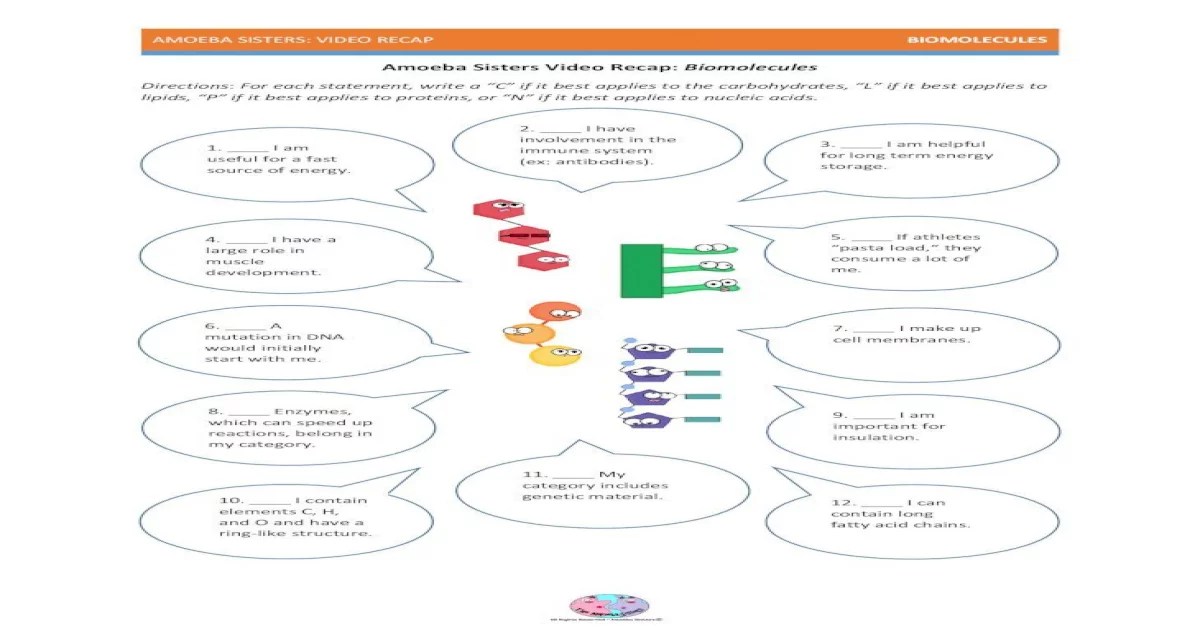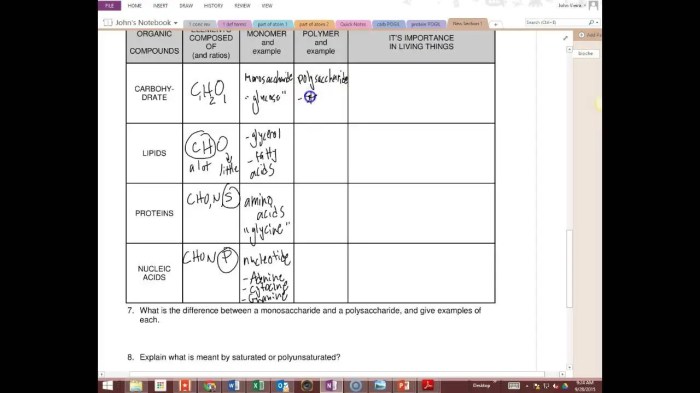Welcome to the biomolecules on the menu answer key, a comprehensive resource that unlocks the secrets of food’s molecular composition. From understanding the diverse types of biomolecules found in our meals to exploring their impact on our health and safety, this guide empowers you with the knowledge to make informed choices about the food you consume.
Delve into the fascinating world of carbohydrates, proteins, lipids, and nucleic acids, and discover their unique roles in providing energy, building tissues, and regulating bodily functions. Explore how cooking techniques can transform biomolecules, enhancing or diminishing their nutritional value. Gain insights into the crucial role of biomolecules in food preservation, preventing spoilage and ensuring food safety.
1. Biomolecules in Food
Biomolecules are the building blocks of all living things, and they are also found in the food we eat. The three main types of biomolecules are carbohydrates, proteins, and lipids. Carbohydrates provide energy, proteins build and repair tissues, and lipids store energy and help to insulate the body.
Examples of Foods Rich in Specific Biomolecules
- Carbohydrates: bread, pasta, rice, potatoes, fruits, vegetables
- Proteins: meat, fish, poultry, eggs, dairy products, beans, nuts
- Lipids: butter, margarine, oil, nuts, seeds
Importance of Biomolecules for Human Health
Biomolecules are essential for human health. They provide the body with the energy it needs to function, they help to build and repair tissues, and they help to protect the body from disease.
2. Biomolecules in Cooking: Biomolecules On The Menu Answer Key

Cooking can affect the biomolecules in food in a number of ways. Heat can break down carbohydrates and proteins, and it can also cause lipids to oxidize. These changes can affect the taste, texture, and nutritional value of food.
How Cooking Can Enhance or Diminish the Nutritional Value of Food
- Cooking can enhance the nutritional value of food by making it easier to digest and absorb nutrients. For example, cooking vegetables can break down the cell walls, which makes the nutrients more accessible to the body.
- Cooking can also diminish the nutritional value of food by destroying nutrients. For example, cooking meat at high temperatures can destroy some of the B vitamins.
Tips for Preserving Biomolecules During Cooking
- Cook food at low temperatures for shorter periods of time.
- Use moist cooking methods, such as steaming or braising, instead of dry cooking methods, such as frying or grilling.
- Add antioxidants to food to help prevent the oxidation of lipids.
3. Biomolecules and Food Preservation
Biomolecules play a role in both food preservation and food spoilage. Some biomolecules, such as antioxidants, can help to preserve food by preventing the oxidation of lipids. Other biomolecules, such as enzymes, can cause food to spoil by breaking down proteins and carbohydrates.
How Biomolecules Can Contribute to Food Spoilage, Biomolecules on the menu answer key
- Enzymes can break down proteins and carbohydrates, which can cause food to rot.
- Bacteria can produce toxins that can make food unsafe to eat.
- Mold can grow on food, which can make it unappetizing and unsafe to eat.
Methods Used to Preserve Biomolecules in Food
- Freezing: Freezing can slow down the activity of enzymes and bacteria, which can help to preserve food.
- Canning: Canning involves heating food to a high temperature to kill bacteria and enzymes. The food is then sealed in a can to prevent recontamination.
- Drying: Drying can remove moisture from food, which can help to prevent the growth of bacteria and mold.
4. Biomolecules and Food Safety

Biomolecules can be used to detect foodborne pathogens and ensure food safety. For example, polymerase chain reaction (PCR) can be used to detect the DNA of foodborne pathogens, such as Salmonella and E. coli.
Importance of Biomolecules in Ensuring Food Safety
Biomolecules are essential for ensuring food safety. They can be used to detect foodborne pathogens, identify the source of foodborne outbreaks, and develop new methods to prevent foodborne illness.
Methods Used to Prevent Biomolecule Contamination in Food
- Good hygiene practices: Good hygiene practices, such as washing hands and surfaces, can help to prevent the contamination of food with biomolecules.
- Proper cooking: Proper cooking can kill foodborne pathogens and prevent the contamination of food with biomolecules.
- Safe storage: Safe storage practices, such as refrigerating food and storing food in clean containers, can help to prevent the contamination of food with biomolecules.
5. Biomolecules and Food Technology
Biomolecules are used in the development of new food products and to improve the quality and safety of food. For example, biomolecules can be used to create new flavors, textures, and colors in food. Biomolecules can also be used to improve the nutritional value of food and to develop new methods to preserve food.
How Biomolecules Can Be Modified to Improve Food Quality and Safety
- Biomolecules can be modified to improve the taste, texture, and appearance of food.
- Biomolecules can be modified to improve the nutritional value of food.
- Biomolecules can be modified to develop new methods to preserve food.
Potential of Biomolecules in Future Food Applications
Biomolecules have the potential to revolutionize the food industry. They can be used to develop new food products, improve the quality and safety of food, and reduce food waste. As our understanding of biomolecules continues to grow, we can expect to see even more innovative and groundbreaking applications of biomolecules in the food industry.
Quick FAQs
What are the four main types of biomolecules?
Carbohydrates, proteins, lipids, and nucleic acids.
How do cooking methods affect biomolecules?
Cooking can alter the structure and composition of biomolecules, affecting their nutritional value and bioavailability.
What role do biomolecules play in food preservation?
Biomolecules contribute to food preservation by inhibiting microbial growth and preventing spoilage.